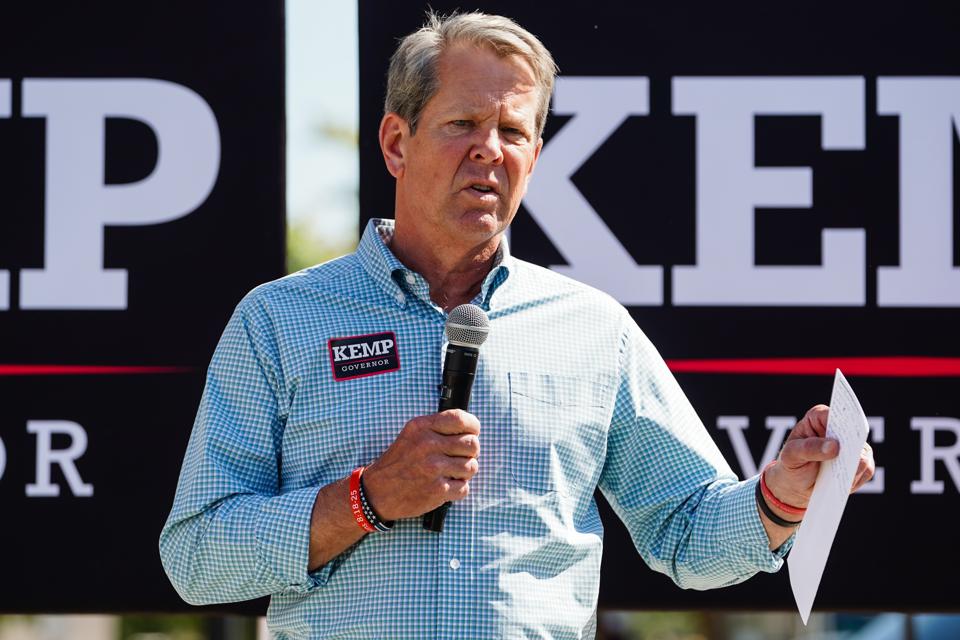Helping students cheat in school is now illegal in Georgia.
On Wednesday, Governor Brian Kemp made that official by signing Senate Bill 213. The law makes it illegal to be compensated to “provide or otherwise cause to be provided any work product to a student or examinee in a substantially completed form that could, under the circumstances, reasonably be considered as being, or forming a part of, an assessment task.”
According to the law, students covers public, private, and home-schooled K-12 students, all college students, and anyone taking courses or seeking certifications for career licenses or credentials in the state.
Importantly, the law applies to “any individual, partnership, firm, limited liability company, association, corporation, or other legal entity or unincorporated organization” that may profit from selling answers, essays, or other academic work that can be used for a grade, credit, or certification.
Selling cheating services, often slyly and deceptively branded as tutoring or “homework help,” is known as contract cheating. And contract cheating is a global, multi-billion-dollar business that experts say is destroying the integrity of education by essentially allowing students to pay for grades, diplomas, degrees, and career certifications.
Many countries such as Ireland, Australia, and England have banned contract cheating, to varying success. But in the United States, contract cheating has been left to states, most of which have let the practice of selling essays and exam answers remain perfectly legal. By signing the law, Georgia became just the 19th state with laws related to cheating. And even in states where it is illegal to sell cheating services, enforcement has been absent. Under the new Georgia law, enforcement power rests with the State’s Attorney General, Chris Carr. His attitude regarding the selling of academic fraud and devaluing education in Georgia may be different.
On its own, for another state to draw a line against contract cheating is important. But the story behind this new law is no less remarkable.
Pushing the new law is a rather new, clearly potent coalition of education institutions and leaders – The Credential Integrity Action Alliance. Its founding members include schools such as Western Governors University and University of Maryland, Global Campus, as well as leading education companies such as Pearson VUE, Wiley, CompTIA, Proctorio, and Turnitin.
Rachel Schoenig, CEO of Cornerstone Strategies and Board Member of CIAA, told me, “These members have joined together to change the laws in the United States and to raise awareness of the harm caused by commercial cheating services.”
Michael Clifton, an Executive Director at CIAA and Vice President at Cornerstone Strategies, said CIAA would, “raise awareness of the harm caused by commercial cheating services and to actively change the laws. Commercial cheating services undermine education, workforce readiness, and our professional licensure protections. Education and assessment are critical parts of creating a skilled and competent workforce.” He continued, “By preying on vulnerable learners and test takers, commercial cheating services are putting the public at risk.”
The laws that CIAA is pushing, and passing, are more comprehensive and better than existing laws in other countries and some states, according to Schoenig. The CIAA playbook goes, “even further and protecting not only higher education integrity but also the credentialing and licensure assessments that support workforce readiness and protect the public health and safety,” she said.
“The current laws in the United States are not sufficient to address cheating providers. Commercial cheating services can blatantly advertise and encourage cheating without consequence. The handful of states with laws that address the sale of cheating services have statutes that pre-date the internet and are not designed to address today’s issues. Cheating services are taking advantage of these archaic laws for their own profit,” Schoenig said.
For example, Schoenig said, “Many of these commercial cheating service providers are sophisticated entities. Some have tried to exploit loopholes in existing statutes by framing their work as tutoring or by putting provisions in the fine print of their contracts. CIAA’s model statute seeks to close these loopholes and to hold entities accountable if they know or should know that their services are being used to undermine academic or assessment integrity. An entity that advertises and encourages cheating shouldn’t be allowed to contract away that responsibility in the fine print.”
Schoenig and Clifton both said that, to those who work in education or assessment, the threats posed by contract cheating providers are real and obvious.
“We know how much these services have grown and how blatantly they encourage learners and test takers to violate integrity and testing rules. We need to do a better job of sharing how they are preying on vulnerable individuals, undermining our workforce and licensure protections, and in some instances even attempting to extort and blackmail users later. These services aren’t about helping others, they are about profit, plain and simple, and profit at the expense of the United States public,” said Clifton.
Georgia may be the first state to enact a modern approach to cracking contract cheating, but it should not be the last, CIAA leaders say. The group is already working on other states to pass similar laws, and hold contract cheating companies accountable.
That selling answers to exam questions, entire graded essays, and other academic course work is legal in the United States – and in most of the states – is embarrassing. And it’s allowed cheating to prosper, in public, for profit. With action and investment from CIAA, and laws like the new one in Georgia, that may be about to change.

